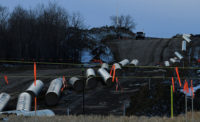The demise of TransCanada Corp.’s $12.5-billion Energy East pipeline has put another dent in Canada’s ambitious infrastructure plans, but the void may get filled with other large, albeit controversial, energy projects.
TransCanada will take a $1-billion charge for pipeline planning and its federal review process. The 2,796-mile line would have funneled oil from Alberta’s fields to St. John on Canada’s Atlantic coast. The project had been set to begin in 2018, but construction would have required 14,000 workers a year, with another 3,300 a year during its first two decades in operation, say TransCanada projections. Houston-based Quanta Services, a major pipeline builder, was one potential project bidder, said Jamie Cook, head construction-sector analyst at Credit Suisse in an Oct. 6 research note.
But the decision to kill the project could help to bolster efforts to revive the company’s Keystone XL pipeline and other, equally controversial projects, she added. That includes “Enbridge’s Line 3 to the U.S., which faces staunch opposition there,” said one CBC radio commentator. “Kinder Morgan’s Trans Mountain line to British Columbia may have got the green light from Ottawa, but its opponents were lined up in court this week, arguing there’s no legal case … for opening up B.C.’s coast to more oil tankers.”
While TransCanada’s Oct. 5 statement did not state reasons for its decision, officials in Alberta, a major project supporter, pointed to the exhaustive federal review process. A week before TransCanada’s announcement, the National Energy Board ruled that it would require an environmental impact review of the oil to be delivered through the pipeline, weighing future carbon emissions from both its production and consumption. But economists have argued that a steep decline in oil prices since the line was proposed in 2013 and a drop in demand for oil extracted from Alberta’s oil sands made unfeasible the long and expensive pipeline from western Canada to New Brunswick.
The Energy East project also ran into fierce opposition from environmental activists and others, particularly in Quebec, where the pipeline would have to cross. “It does tell us that getting social license for take-away capacity for oil sands is getting increasingly more difficult,” said Maxim Sytchev, construction-industry analyst at the National Bank Financial.
Oil transport firms committed to Energy East now can sign up with Keystone, said Andrew Leach, a University of Alberta business-school professor, in an Oct. 5 editorial in The Globe and Mail newspaper. “With more pipelines fighting over less oil to ship, TransCanada likely saw it would be cannibalizing Keystone XL,” he said. “Better to make money on one project than lose money on two.”
Alberta Premier Rachel Notley has pledged to redouble efforts to win approval for the Trans Mountain line. “This decision highlights the importance of diversifying market access and the subsequent national priority that must be placed on the Trans Mountain project,” Notley said in a statement.





